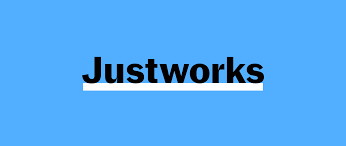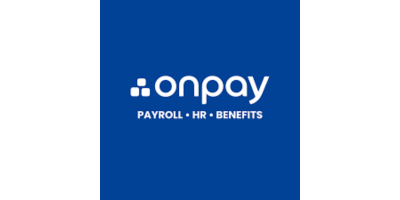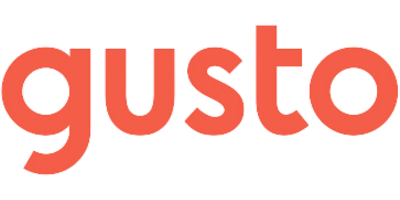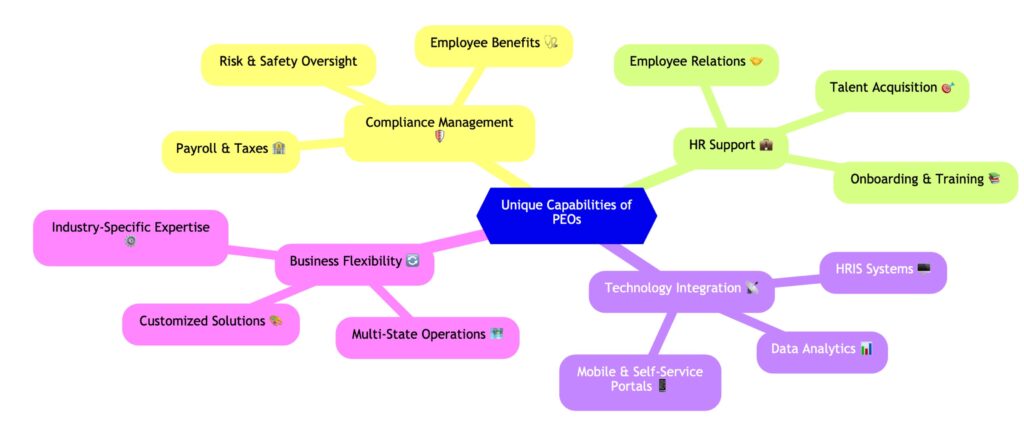What is a PEO? Professional Employer Organization Explained
A PEO (Professional Employer Organization) is a company that partners with businesses to manage essential HR functions. By entering into a co-employment agreement, the PEO shares certain responsibilities with the business. This allows the PEO to handle tasks such as payroll, employee benefits, tax filings, and regulatory compliance, while the business maintains control over day-to-day operations and decisions regarding employees. Let PEOcosts.com help you find the perfect PEO fit!
FEATURED PEO PROVIDERS

Pros: Perfect for small businesses
Cons: Fewer benefit options
Cost: $50/Month + $8/User

Pros: User-friendly interface
Cons: Fewer integrations available
Cost: $29.99/Month + $6/User

Pros: Intuitive user experience
Cons: Limited outside U.S. services
Cost: $40/Month + $6/User

Pros: Integrated platform simplicity
Cons: Complex pricing structure
Cost: $35/Month + $8/User
WHY USE A PEO?
Businesses use PEOs to manage complex HR tasks like payroll, employee benefits, tax filings, and regulatory compliance. Small and mid-sized companies especially benefit from PEOs because they provide access to more competitive healthcare plans, retirement options, and insurance packages that would otherwise be difficult or expensive to secure independently. PEOs also help businesses stay compliant with labor laws and regulations, reducing the risk of costly fines and legal issues. By outsourcing time-consuming administrative tasks, companies can focus more on strategic activities, such as growing their business, improving products, and managing customer relationships. Additionally, PEOs can assist with recruitment, employee onboarding, and performance management, making them valuable for companies looking to scale without building a large internal HR team. Ultimately, PEOs save businesses time, reduce costs, and provide peace of mind by ensuring HR functions run smoothly and in full compliance.
HOW DOES PEO WORK?
A PEO works through a co-employment agreement, where the PEO becomes the employer of record for tax and legal purposes, while the business retains control over daily operations and employee management. The PEO handles tasks like payroll processing, benefits administration, workers’ compensation, and tax compliance, ensuring these functions are performed accurately and in line with regulations. Employees are technically listed under the PEO for benefits and tax filings, giving businesses access to better benefits packages and insurance rates. Meanwhile, the business focuses on managing its employees’ performance and day-to-day tasks. The PEO also offers HR support, such as helping with onboarding, policy development, and handling regulatory changes. This shared responsibility allows companies to operate more efficiently, reduce administrative burdens, and minimize compliance risks. By streamlining back-office operations, the PEO ensures that businesses can scale smoothly without needing a large in-house HR department.
PEO 101
EVERYTHING YOU EVER NEEDED TO KNOW ABOUT PEO SERVICES
PROS AND CONS OF PEO
Pros of PEO:
PEOs help businesses access better employee benefits at lower costs by leveraging group rates. They also streamline payroll, HR, and compliance, reducing the administrative workload. PEOs offer expertise in labor laws and tax regulations, helping companies avoid costly mistakes. This service allows businesses to focus more on core operations, improving productivity and growth potential. PEOs also handle employee onboarding, performance management, and workers’ compensation, ensuring smooth HR operations.
Cons of PEO:
Businesses may feel they lose some control over HR processes, as PEOs take over many administrative functions. Additionally, PEO services involve fees, which may not be ideal for all budgets, particularly for very small companies. Customization of HR policies can also be limited, as PEOs often standardize their offerings. Some businesses may experience challenges when terminating the agreement, including transitioning HR functions back in-house or to a new provider.
TYPES OF BUSINESSES THAT USE PEO
Many types of businesses turn to PEOs to handle payroll, benefits, and compliance while focusing on growth. Below is a list of 12 industries that frequently rely on PEOs to manage their HR needs efficiently:
- Healthcare Practices – Doctors, dentists, and clinics
- Law Firms – Small to mid-sized legal practices
- Construction Companies – Contractors and builders
- Tech Startups – Early-stage and scaling software companies
- Manufacturing Firms – Factories and production facilities
- Retail Businesses – Stores, boutiques, and e-commerce shops
- Restaurants and Hospitality – Hotels, bars, and food service providers
- Real Estate Agencies – Brokers and property managers
- Nonprofit Organizations – Charities and social enterprises
- Consulting Firms – Business, marketing, and financial consultants
- Marketing Agencies – Digital and creative service providers
- Engineering Firms – Design, civil, and mechanical engineering businesses
PEO’S HAVE DIFFERENT CAPABILITIES

WHAT WILL A PEO COST?
The cost of a PEO typically ranges from 2-12% of payroll or a flat fee of $900 to $1,500 per employee per year, depending on the provider and services offered. Several factors impact these costs.
Key influencers include the size of the workforce (larger businesses may receive volume discounts), industry type(higher-risk industries, like construction, may have higher workers’ compensation premiums), and payroll amount (since costs are often percentage-based).
The level of services provided also plays a role—companies requiring more extensive HR support, such as recruitment or customized employee training, may incur higher fees. Additionally, access to premium employee benefits like health insurance or retirement plans can affect pricing, as some plans are more costly.
PEOs offer value by bundling services, but businesses should carefully evaluate their needs to ensure they are not overpaying for unnecessary features or underestimating essential services.
WHAT IS A CERTIFIED PEO
A Certified PEO (CPEO) is a Professional Employer Organization that has received official certification from the Internal Revenue Service (IRS). This certification ensures the PEO meets specific financial, operational, and compliance standards, giving businesses added assurance about the provider’s reliability and trustworthiness.
One of the key benefits of working with a CPEO is that they assume sole responsibility for paying federal payroll taxes, eliminating the risk of double tax liabilities for employers. Certification also means the PEO has undergone thorough background checks, demonstrated financial stability, and maintained compliance with federal regulations.
CPEOs must submit audited financial statements regularly to the IRS, ensuring ongoing transparency. For businesses, partnering with a certified PEO can offer peace of mind, knowing the provider is held to high standards. However, it’s important to note that certification does not imply IRS endorsement, only that the PEO meets stringent federal criteria.
CONNECT WITH A CERTIFIED PEO COMPANY
IT COULD NOT BE EASIER. LEARN MORE ABOUT PEO BRANDS YOU KNOW AND TRUST.
FREQUENTLY ASKED QUESTIONS
WHAT TO LOOK FOR IN A PEO
When choosing a PEO, businesses should consider several key factors:
- Certification – Look for IRS-certified PEOs (CPEOs) to ensure financial reliability and compliance.
- Service Offerings – Ensure the PEO provides the HR services your business needs, like payroll, benefits, compliance, and workers’ compensation.
- Industry Experience – Select a PEO with experience in your industry for tailored support and risk management.
- Benefits Packages – Evaluate the quality and affordability of employee benefits offered, such as healthcare and retirement plans.
- Technology – Check if the PEO uses modern HR software for easy payroll processing and reporting.
- Transparency in Fees – Look for clear pricing with no hidden costs.
- Customer Support – Choose a PEO with responsive and knowledgeable support.
- Contract Flexibility – Ensure the contract allows for easy termination or changes if needed.
- Reputation and Reviews – Research client feedback and PEO performance history to assess reliability.


PEO VS HR OUTSOURCING. WHAT’S THE DIFFERENCE?
The main difference between PEO and HR outsourcing lies in the scope and structure of services.
A PEO enters a co-employment agreement with the business, meaning the PEO shares legal responsibilities, including payroll taxes and employee benefits. This setup provides access to better benefits and reduces compliance risks, making PEOs ideal for businesses seeking comprehensive HR management.
In contrast, HR outsourcing involves delegating specific HR tasks—like recruitment, payroll, or compliance—to an external provider, but the business retains full legal responsibility. HR outsourcing offers more flexibility, as companies can pick and choose which functions to outsource, rather than committing to the bundled services that come with a PEO.
PEOs are better suited for companies looking for end-to-end HR solutions with shared liability, while HR outsourcing works for businesses that need targeted support without giving up employer control.
ENJOY THE BENEFITS OF PEO SERVICES
PAYROLL – TAX COMPLIANCE – HUMAN RESOURCES – HEALTH INSURANCE – RISK AND SAFETY MANAGEMENT – RECRUITMENT – ONBOARDING
